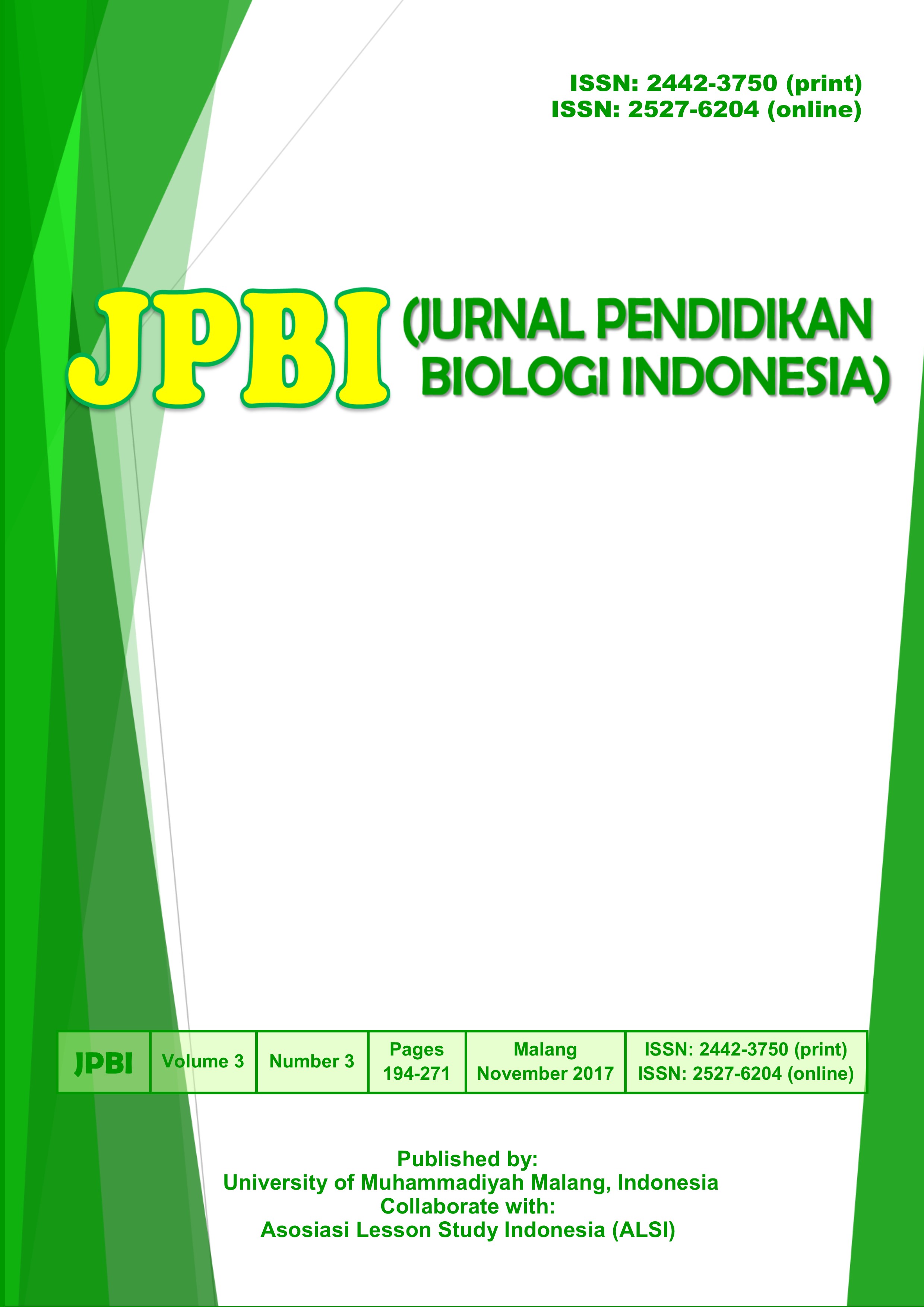Developing of environmental education textbook based on local potencies
DOI:
https://doi.org/10.22219/jpbi.v3i3.4540Keywords:
Environmental education, local potential, textbookAbstract
Environmental education subject aims to form students who have the character to maintain the environment. One effort to achieve the objectives of the Environmental education subject is the local Environmental Education Textbook Based on Local Potencies. This research was aimed to produce textbook of environment-based education subject Environmental education based on local potencies. This research and development using Borg & Gall model (1983). This study uses only five stages of the Borg & Gall model, namely (1) need analysis, (2) planning, (3) develop preliminary form of product, (4) preliminary field testing, and (5) main product revision, due to time constraints and cost. The results of the research and development that has been done is a textbook of environmental education based on local potencies that is suitable for use in semester 5 collage level.
Downloads
References
Ardan, A.S. (2016). The development of biology teaching material based on the local Wisdom of Timorese to improve student’s knowledge and attitude of Environment in caring the preservation of environment. International Journal of Higher Education. 5(3), 190-200.
Arikunto, Suharsimi. (2002). Prosedur Penelitian Suatu Pendekatan Praktek (Edisi Revisi). Jakarta : Rineka Cipta.
Budiarso, A.S. (2016). Pengembangan bahan ajar berbasis metode Hypnoteaching untuk memotivasi siswa SMP dalam belajar IPA pada materi energy terbarukan. Jurnal Pena Sains, 3(2), 132-141.
Borg, W.R. & Gall, M.D. (1983). Educational research: an introduction. 4th Edition. New York: Longman Inc.
Haerullah, A. (2017). Pengembangan bahan ajar biologi melalui pemanfaatan jenis Gastropoda mangrove sebagai sumber pangan masyarakat Kecamatan Jailolo. Edukasi. 15 (1), 621-629.
Husamah, H., Rohman, F., & Sutomo, H. (2015). Development of enrichment book of animal ecology based on collembola community structure research throughout watershed brantas upstream of Batu City. Prosiding Seminar Nasional Pendidikan Biologi 2015. Retrieved from http://research-report.umm.ac.id/index.php/research-report/article/view/461
Irmawati, F., Oktaviana, I., Lia, R., (2016). Pengembangan bahan ajar pengetahuan lingkungan berbasis web untuk meningkatkan motivasi mahasiswa IKIP Budi Utomo Malang. Florea, 3(1), 12-20.
Ministerial Decree of National Education of Indonesia Number 36/D/O/2001) about technical directions of implementation assessment of credit number of dosen.
Langgeng. Sajidan. Prayitno, B.A., (2017). Pengembangan model pembelajaran inkuiri kolaboratif berbasis potensi lokal dan implementasinya pada materi tumbuhan lumut dan paku. Jurnal Inkuiri, 6(1), 1-16.
Lase, N.K. Sipahutar, H. Harahap, F. (2016). Pengembangan lembar kegiatan siswa (LKS) berbasis potensi lokal pada Mata pelajaran biologi SMA kelas XII. Jurnal Pendidikan Biologi, 5(2), 99-107.
Marlina, Reni. Hardigaluh, B. Yokhebed. (2015). Pengembangan modul pengetahuan lingkungan berbasis potensi lokal untuk menumbuhkan sikap peduli lingkungan mahasiswa pendidikan biologi. Jurnal Pengajaran MIPA, 20(1), 94-99.
Meilani, R. (2009). Implementasi PLH di sekolah sekitar hutan. Paper presented at Workshop Pengembangan Model Jaringan Kemitraan Antara Pengelola Kawasan Hutan dengan Sekolah dalam Penerapan PLH, page 1-8.
Noviar, D. Sulistiawati. (2013). Pengembangan ensiklopedia berbasis potensi lokal sebagai bahan ajar mandiri bagi siswa SD/MI. Paper presented at National Seminar XI Education of Biology faculty teacher and education science UNS, page 1060-1068.
Mumpuni, K. E. Susilo, H. Rohman, F. (2013). Potensi tumbuhan lokal sebagai sumber belajar biologi. Paper presented at National Seminar XI Education of Biology faculty teacher and education science UNS, page 825-829.
Prabowo, D.L. Nurmiati. Maridi. (2016). Pengembangan modul berbasis potensi lokal pada materi ekosistem sebagai bahan ajar di SMA N 1 Tanjungsari, Gunungkidul. Paper presented at National Seminar XI Education of Biology faculty teacher and education science UNS, page 192-195.
Sardiman. (2011). Interaksi dan Motivasi Belajar Mengajar. Jakarta: PT. Rajagrafindo Persada.
Sarah, S. & Maryono. (2014a). Pengembangan perangkat pembelajaran berbasis potensi lokal untuk meningkatkan living values peserta didik SMA 01 Kabupaten Wonosobo. Jurnal Teknologi Technoscientia, 2(6), 185-194.
Sarah, S., & Maryono. (2014b). Keefektivan pembelajaran berbasis potensi lokal dalam Pembelajaran fisika SMA dalam meningkatkan Living values siswa. Jurnal Pendidikan Sains, 2(1), 36-42.
Situmorang, R.P. (2016). Analisis potensi lokal untuk mengembangkan bahan ajar Biologi di SMA negeri 2 wonosari. Jurnal Pendidikan Sains, 4(1), 51-57.
Suwastono, A. (2011). Pengembangan pembelajaran E-learning berbasis moodle pada mata kuliah penginderaan jauh S1 jurusan geografi Universitas Negeri Malang. (Unpublished Thesis). Universitas Negegi Malang.
Suwarni, E. (2015). Pengembangan buku ajar berbasis lokal materi keanekaragaman laba-laba di kota metro sebagai sumber belajar alternatif biologi untuk siswa SMA kelas X. bioedukasi, 6(2), 86-92.
Karim, Asrul. (2011). Penerapan metode penemuan terbimbing dalam pembelajaran matematika untuk meningkatkan pemahaman konsep dan kemampuan berpikir kritis siswa sekolah dasar. Paper presented at Mathematics and Applied Seminar.
Yulicahyani, T. (2017). Pengembangan modul pembelajaran IPA fisika materi suhu dan pemuaian berbasis potensi lokal “kerajinan logam sayangan” untuk siswa SMP di Kalibaru Banyuwangi. Jurnal Pembelajaran Fisika, 6(2), 116-123.
Downloads
Published
Issue
Section
License
Authors who publish with JPBI (Jurnal Pendidikan Biologi Indonesia) agree to the following terms:
- For all articles published in JPBI, copyright is retained by the authors. Authors give permission to the publisher to announce the work with conditions. When the manuscript is accepted for publication, the authors agree to automatic transfer of the publishing right to the publisher.
- Authors retain copyright and grant the journal right of first publication with the work simultaneously licensed under a Creative Commons Attribution-ShareAlike 4.0 International License that allows others to share the work with an acknowledgment of the work's authorship and initial publication in this journal.
- Authors are able to enter into separate, additional contractual arrangements for the non-exclusive distribution of the journal's published version of the work (e.g., post it to an institutional repository or publish it in a book), with an acknowledgment of its initial publication in this journal.
- Authors are permitted and encouraged to post their work online (e.g., in institutional repositories or on their website) prior to and during the submission process, as it can lead to productive exchanges, as well as earlier and greater citation of published work (See The Effect of Open Access).

This work is licensed under a Creative Commons Attribution-ShareAlike 4.0 International License.


















